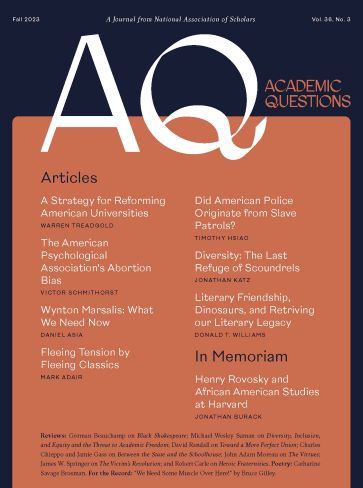When Henry Rosovsky passed away on November 11, 2022, published eulogies were full of effusive praise. That praise was merited. Rosovsky was a towering figure not only at Harvard, but in American higher education generally. An economics professor, he was also Dean of the Faculty of Arts and Sciences from 1973 to 1984 and from 1990 to 1991. He served twice as acting president of Harvard and was an important leader during a time of change and upheaval. All of this was noted in the eulogies.
However, what few of the announcements captured fully was the degree to which Rosovsky confronted and challenged some of the worst tendencies of modern academe as they were first emerging. It’s perhaps understandable that the eulogies mentioned this in muted tones. Rosovsky was himself an admirably genial, moderate, and graceful gentleman. Yet it is a fact that he identified and forcefully challenged the twin dangers of politicization and mediocrity as they emerged in American academic life in the 1960s and beyond.
Rosovsky’s chance to do this came in 1968-69 in the context of growing racial tensions and student anti-war agitation. In response to these tensions, Rosovsky was put in charge of the Harvard Faculty Committee on African and Afro-American Studies. In January 1969 the committee called on the university to create Harvard’s first program of African American studies. In February, the faculty accepted the committee’s recommendations. Nevertheless, the report also drew criticism from the more militant among Harvard’s black students. Their objections focused on three matters: the report created an “Afro-American Studies Committee,” rather than a full department; it denied a role for students in choosing tenured faculty for the new program; and it established a “combined undergraduate major” (combining, that is, African American studies with work in one other established field such as economics or anthropology.)
This last point proved especially controversial. Many of the black students wanted a single concentration in African American studies. Rosovsky believed that “Afro-American studies must start as a combined major, so that the student who gets this bachelor’s degree has minimum competence in an established field in which graduate work is offered.” In a 1969 article for The American Scholar, he summarized the criticisms and his response to them this way:
Some black students did not at all like the emphasis on established fields. They conceived of Afro-American studies almost as a professional subject primarily designed to produce community leaders. These students wanted to “return to their communities” immediately after college and saw no need to be prepared for advanced degrees. Perhaps this is the way they will lead their lives, but it is equally likely that some of these ideas are merely freshman and sophomore rhetoric. Certainly, the black community needs leaders, and students are a natural source of supply. But a graduate degree in a sorely needed skill—such as economics—does not dilute one’s communal leadership qualities.1
Having accepted the Rosovsky committee report in February, the faculty then reversed itself on April 22. Its sudden change of heart took place in response to crisis conditions at Harvard. On April 9, anti-war radicals led by Students for a Democratic Society (SDS) occupied University Hall. Several hundred police officers cleared the building. Students organized a strike. A general atmosphere of fear pervaded the campus. A new, more militant black student leadership allied itself with SDS and made demands with implied threats of more disorder. In altering the Rosovsky committee’s proposals, the faculty basically agreed to the demands of the militant students—in particular, by eliminating the joint concentration requirement and by giving black students a voice in the hiring and firing of faculty. In response, Rosovsky resigned from what was at that point a follow-up Standing Committee on Afro-American Studies.
However, in the 1970s and ‘80s Rosovsky would continue to be involved in the evolution of the Afro-American Studies department. He was often at odds with militant black activists and radical professors such as one-time head of the department Ewart Guinier (father of Lani Guinier, also a Harvard Law professor nominated in 1993 by Bill Clinton for U.S. Assistant Attorney General for Civil Rights before her name was withdrawn amid controversy over her views on racial gerrymandering and other issues.) He succeeded in part because black students and faculty were not uniformly committed to the militant, pan-Africanist vision of the more radical among them. African American professors such as Martin Kilson and Orlando Patterson shared much of Rosovsky’s commitment to traditional standards of scholarship, centrist civil rights liberalism, and an administrative structure like that of the established departments. Revisions in 1972 did bring the department back closer to Rosovsky’s original vision. For example, students would no longer have a say in hiring new faculty.
Nevertheless, the department remained troubled and understaffed. In a dispute in 1979, for example, Professor Guinier said, “Dean Rosovsky has done everything to thwart the development of the department. He personally opposed the establishment of the department. He has always believed that the department should be a committee.” Rosovsky responded, "The record speaks for itself. We've invested heavily in the department. We've tried to make tenured department appointments. Guinier's statements are doing a grave disservice to the future of the department."2
Rosovsky’s hopes for the department changed in 1991, when he helped bring the highly acclaimed scholar Henry Louis Gates Jr. to Harvard from Duke. Gates became the chair of the Afro-American Studies department that fall. He remained in that position until 2006, during which time he did attract other top scholars to the department. In that sense Rosovsky was entitled to feel a sense of closure and satisfaction. He stood up for academic rigor and traditional standards of scholarship at a time when the student upheavals of the 1960s had challenged them in dramatic ways.
In light of trends in education since, however, it is reasonable to wonder whether his defense of the university would be adequate to today’s challenges. In his 1991 book The University; An Owner’s Manuel,3 Rosovsky celebrated the traditional university’s hierarchical authority structure of administration, faculty, and students. His greatest worries were about the student revolt and the dangers it posed to traditional non-partisan scholarship. He was wary as well about administrators, saying, “I am personally certain that the quality of a school is negatively correlated with the unrestrained power of administrators.”4 His main hope was for the neutrality and professionalism of the faculty.
Today, the Harvard faculty is overwhelmingly liberal or left in its views—far more so than in the 1970s or ‘80s. Meanwhile, university administration has become bloated and infused with a political agenda via its diversity, equity, and inclusion (DEI) bureaucracy. Students, though often politically radical, have adopted a reliance on administrative supervision that radicals of Henry Rosovsky’s day would have rejected forcefully. It simply isn’t clear how Rosovsky would have dealt with these newer challenges.
Nevertheless, his moderation and love of the academy’s structures and ideals stood him in good stead in the battles he engaged in over African American studies at Harvard.
Jonathan Burack is a Harvard graduate, class of '64, who has produced history curriculum materials for high schools for several decades, including a line called MindSparks. He is currently working on curriculum projects free of the radical distortions endangering even-handed approaches to K-12 history instruction.
1 Henry Rosovsky, “Black Studies at Harvard: Personal Reflections Concerning Recent Events,” The American Scholar 38, no. 4 (Autumn 1969): 567.
2 Esme C. Murphy, Maxine S. Pfeffer, “Visiting Committee Report Recommends Changing Afro-Am to a Committee,” The Harvard Crimson, November 30, 1979.
3 Henry Rosovsky, The University: An Owner's Manual (W.W. Norton & Company, 1991).
4 Ibid., 13.
Photo by Hans Isaacson on Unsplash














